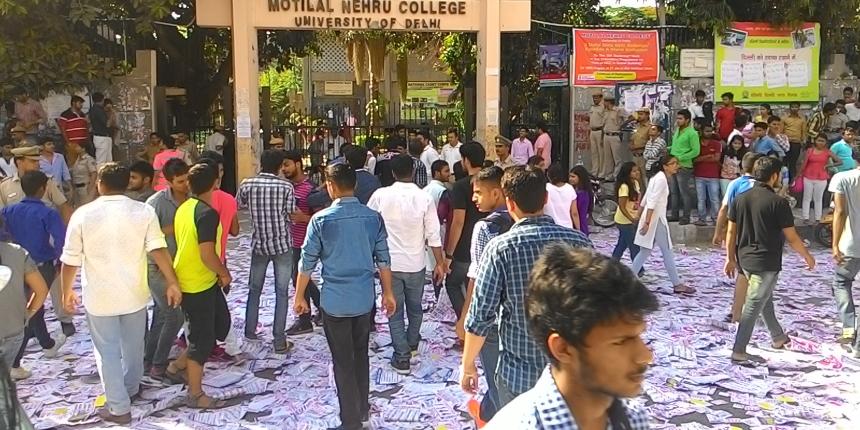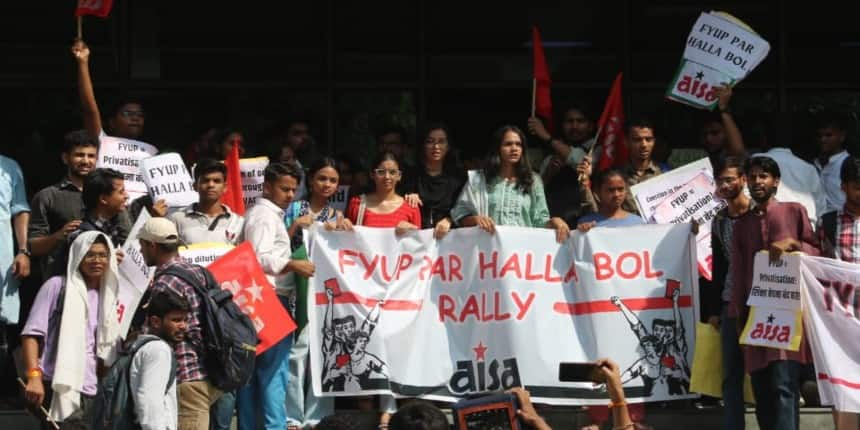Fees, hostels, FYUP are major agendas for first DUSU elections since 2019
Atul Krishna | September 7, 2023 | 11:10 AM IST | 6 mins read
DUSU Elections 2023: ABVP, NSUI, SFI, AISA on issues that matter – hostels, fees, FYUP – in the Delhi University Students Union polls.
Colleges/Universites Accepting CUET Score
Download list of Colleges/ Universities Accpeting CUET/CUCET Score with Cut-OFFs
Download Now
NEW DELHI: Shortage of hostels, rising charges in paying-guest and rented accommodations, syllabus changes and the four-year undergraduate programme (FYUP) – these are the issues that will take centre stage in the Delhi University Students Union (DUSU) elections. The DUSU elections are scheduled for September 22.
Latest: Check DU PG Seat Allotment 2025 | Vacant Seats for Spot Round 4
DU PG Spot Round 2025: First Cutoff | Second Cutoff | Third Cutoff
DU PG 2025: Third Cutoff | Second Cutoff | First Cutoff
Don't Miss: NIRF DU Colleges Ranking
The upcoming DUSU elections will be the first student poll at the university after a gap of four years. Delhi University (DU) was unable to hold elections since 2019, when the last union was elected, due to the covid pandemic. The administration had extended the tenure of that union.
In 2019, Akhil Bharatiya Vidyarthi Parishad (ABVP), a students’ group affiliated to the Rashtriya Swayamsevak Sangh (RSS) won three seats including DUSU president, vice president, and joint secretary. The secretary post went to the Congress-affiliate, National Students Union of India (NSUI).
Since then, the education sector has seen massive changes – the National Education Policy (NEP 2020) was adopted, the four-year undergraduate programme (FYUP) was introduced, the syllabus changed, DU’s admission process was replaced by the Common University Entrance Test (CUET) on central diktat.
When DU students go to vote on September 22, they will be electing a new “central panel” of representatives as well as college union members. Among the other contenders in the DUSU election 2023 are the left-leaning All India Students Association (AISA) and Students Federation of India (SFI), and the Aam Aadmi Party’s student wing, Chhatra Yuva Sangharsh Samiti (CYSS).
DUSU elections after four years
Since polls were not held in 2020 and 2021, in many universities, union members held elected positions even when they were no longer students of the university.
Central universities such as Jawaharlal Nehru University (JNU) are yet to announce student elections. However, some like the University of Hyderabad resumed elections in 2022-23. On Wednesday, Panjab University students union election results were announced and NSUI took the president’s post.
“This election is really important. ABVP demanded elections during lockdown because [the union] provides proper representation of students for their demands to be met. It acts as a bridge between students and the authorities,” said Harsh Attri, state secretary, ABVP.
“During covid, there were no elections, there was no student union, there was no body to put the demands of the students in front of the administration. During covid several policy level changes happened for instance, FYUP was introduced. When the students were finding problems with that, there was no student body to raise their voice,” said Abhishek Kumar, Students' Federation of India (SFI) state committee member.
Left-wing student unions such as the SFI and AISA also alleged that the sitting members from ABVP failed to represent students during the months of lockdown and online classes and exams due to covid. However, ABVP countered saying the DUSU office was open for students even during the pandemic.
DUSU Elections: Hostels, rent regulation
All student unions put forth the lack of hostels in Delhi University as one of the major issues they will take up. Although thousands of students study in DU, the number of hostels is far from sufficient leaving students to rely on expensive paying guest accommodation. DU has reintroduced the four-year undergraduate programme (FYUP) and launched numerous courses of the past few years, adding to its total roll-strength.
The unions said they will push for regulation of room rent which have become prohibitive for many students. ABVP and NSUI both said that some sort of rent regulation should be introduced for DU students.
“The university has very limited hostels. Our demand is that the hostel system be centralised. Currently, students have to apply for each and every hostel. We also demand that the number of hostels must be increased. There should be hostels for all girl colleges. We are also demanding room rent control,” said Attri.
 DUSU Elections 2023: Student unions said that hostels, rising rents and FYUP will be take focus in the elections (Image: AISA)
DUSU Elections 2023: Student unions said that hostels, rising rents and FYUP will be take focus in the elections (Image: AISA)
“Paying guest accommodations are unaffordable for the students. We will demand that DU provides more hostels or tie up with the paying guest accommodations. They are paying Rs 6,000 as fees then paying Rs 25,000 for accommodation. That is very unfortunate. Another thing is that they have added GST to hostels. Hostels are a service and shouldn’t be taxed,” said Nitish Gaur, in-charge of NSUI Delhi.
Student unions also said that commuting is “a big problem” and that they will demand metro concessions for DU students.
“DU colleges are scattered across Delhi. Metro is not that affordable for students because they are not financially stable. We demand a concessional metro pass for the DU students,” said Abhishek Kumar, SFI Delhi state committee member.
DUSU Elections: FYUP, DU syllabus changes
The FYUP and major syllabus changes including the Undergraduate Curriculum Framework (UGCF) were introduced last year. Students and teachers had raised many objections to the curriculum framework including the skill enhancement courses (SEC) and vocational education courses (VEC).
“AISA has taken a very clear line. This election is not a normal election. It is a referendum on the FYUP. If you vote for AISA you are voting against this system. Our stand is that any political force that is not against FYUP is not eligible to contest the elections. After the lockdown, the government has made this university into something that is only a shadow of what it used to be,” said Abhigyan, president, AISA Delhi.
“We have raised four demands. Dilution of our courses should stop. They have cut down on core papers and have pushed content in the name of skill with papers such as Yoga, Swach Bharat Abhiyan. The new internal assessment scheme assigns 70 marks to internal evaluation which means that students will be earning 70 marks on vocational and skill development courses. This leaves very little time to actually study the subject they are passionate about,” said Abhigyan.
DUSU Election Agenda: Fee increase, placements
Several other issues are also being raised including the fees of postgraduate courses.
“For PG courses, the fees of the courses depend on where the students are registered although all students attend classes in the university. So we demand that there should be a “one course, one fee” structure,” said Attri of ABVP. For postgraduate programmes, students register with colleges but attend classes at the university faculties.
“Students are also facing problems with placements. The placement cells are not very active. They have also increased fees of many courses by a lot. These are some of the issues we will be taking up,” said Gaur of NSUI.
The two biggest unions at DU, ABVP and NSUI, said that they are in the process of preparing manifestos based on what the students think are the major issues that need to be addressed.
“We have less time to prepare for the elections. This is partly due to the G20 meet. Students are seeing elections after four years so we are among them to increase our members. We are also making students aware of whatever NSUI had done in the past including raising issues such as the online and blended exams during covid. When we make a manifesto that will be based on the students' inputs that we gather through our volunteers,” said Gaur of NSUI.
Follow us for the latest education news on colleges and universities, admission, courses, exams, research, education policies, study abroad and more..
To get in touch, write to us at news@careers360.com.